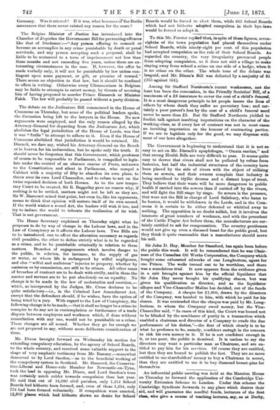The Government is beginning to understand that it is not
se easy to act on Mr. Disraeli's apophthegm, " Omnia aanitaa," ancl that strong Health Bills are very difficult to pass. It seems quite easy to decree that rivers shall not be polluted by refuse from factories, but half the industrial structures of the country have been placed by the side of rivers with the object of utilising them as sewers, and their owners complain that industry is being sacrificed to idyllic dreams and a distant hope of trout. They believe that their waste will be more dangerous to public health if carried into the sewers than if carried off by the rivers, and will fight the Bill stage by stage. So severe is the pressure, that were not the Bill in charge of Lord Salisbury, who hates to be beaten, it would be withdrawn in the Lords, and in the Com- mons it is certain to be either defeated or whittled away to nothing. The opposition is no doubt selfish, but it involves the interests of great numbers of workmen, and with the precedent of the Cattle Plague Act before them, the manufacturers are cer- tainly entitled to ask for compensation. The country gentlemen would not give up even a diseased beast for the public good, but they think it quite reasonable that a manufacturer should move his mill.


































 Previous page
Previous page